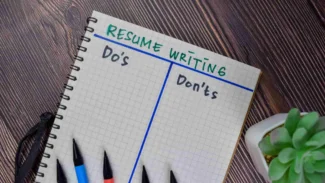- 1. Submitting your resume with typos and grammatical errors
- 2. Only focusing on your duties
- 3. Including too much info
- 4. Being modest and overly “general”
- 5. Using a one-size-fits-all resume
- 6. Telling lies
- 7. Using an unprofessional email address
- 8. Ignoring key skills and requirements
- 9. Including unexplained gaps
- 10. Poor formatting and structure
- 11. Inconsistent verb tense
- 12. Using clichéd buzzwords
- 13. Using an outdated template
- 14. Long and unclear objective statement
- 15. Getting too personal
There are many traps that job seekers fall into and knowing how to write a proper resume is crucial if you want yours to be taken seriously, and to get a job interview.
Unfortunately for many candidates, their resume contains common mistakes and by the time they realize it, it’s too late.
Remember, employers don’t have time to read hundreds of resumes for each posting. Careless mistakes that blur the essence of your professional background may cause readers to dismiss yours in a matter of seconds.
Here are 15 common resume mistakes to avoid when writing a resume.
1. Submitting your resume with typos and grammatical errors
How to avoid this: Spell check your doc, proofread it, double-check it, and then check it again.
It may seem simple, but including spelling or punctuation errors is one of the most common resume mistakes. It can be challenging to spot your own mistakes. Ask a friend or relative to review your document after thoroughly editing it yourself.
These types of mistakes look unprofessional and give a negative first impression, make sure you take steps to avoid them.
2. Only focusing on your duties
How to avoid this: Mention your accomplishments in the workplace.
Listing only job duties can make your resume less impactful. Focus on quantifiable achievements that demonstrate your value to potential employers.
Here is what you should avoid doing when describing your past role(s):
Customer Service Representative
- Answered phone calls
- Responded to customer emails
- Managed customer complaints
Instead, try this:
Customer Service Representative
- Resolved an average of 30 customer inquiries daily via phone and email, maintaining a 95% customer satisfaction rate
- Reduced customer complaint resolution time by 25% through implementing efficient problem-solving techniques
- Recognized as “Employee of the Month” three times for consistently exceeding performance metrics and providing exceptional service
3. Including too much info
How to avoid this: Par down your resume to include the most relevant experiences only.
In many cases, it is best to limit your resume to one or two pages. Using a resume builder is an easy way to mention your qualifications without going overboard.
Too much information is off-putting for hiring managers looking through resumes. Would you want to read through 75 resumes from beginning to end? Irrelevant information will overshadow the strengths and achievements you want to highlight. Try to remove long, wordy phrases and outdated information.
4. Being modest and overly “general”
How to avoid this: Remember that no one can sell you better than YOU!
One of the resume mistakes to avoid when creating your application is not being specific enough. It’s common for job seekers to feel awkward about sharing recognition or awards they’ve received. Don’t be that type of candidate.
But if there was ever a time and place to brag, it is during a job search and on your resume. You should add the following when explaining your past positions:
- awards
- honors
- promotions
This will show you made an impact within the organization you were working for.
5. Using a one-size-fits-all resume
How to avoid this: Create a base resume and then tailor it to the specifics of each job.
Mass resume blasts rarely work. Why? Because there is nothing specific about them! It is much more effective to tailor your resume to meet the needs of different jobs. Highlight the experience and skills you have, placing a heightened focus on the skills mentioned in the job description.
The most effective strategy is to research similar job descriptions in your field to identify words and phrases that are applicable. Then, sprinkle a few of those into your resume before sending.
6. Telling lies
How to avoid this: Identify three skills you can bring to the table and focus on those throughout your job search.
There is a huge difference between tailoring your resume to fit a job and stretching the truth. Highlight your strengths but don’t lie. Employers will check the facts on your resume and uncovering a lie could cost you the position, as well as future positions at the company.
Simply put, lying on your resume does more harm than good. Instead, focus on your unique value and contributions. You may also consider investing in interview coaching to learn how to relate your experiences to future opportunities.
7. Using an unprofessional email address
How to avoid this: Use an email address that contains only your name.
You don’t want to have the hiring manager end your candidacy before it even begins. Make sure your contact information is all professional. That means no emails like “funnyguy129@gmail.com”
Always use a professional email address even if you have to create a new one, such as “Jthompson@gmail”.
8. Ignoring key skills and requirements
How to avoid this: Study job descriptions and create a list of key skills and requirements.
Many employers are now scanning resumes electronically, looking for the core skills and requirements of the vacancy they are filling. Your resume must show that you tick all the boxes if you want an interview.
Read the job description you’re applying for, make a list of the keywords, and then work these into your resume.
9. Including unexplained gaps
How to avoid this: Explain your gap in employment in one brief sentence.
To be clear, your actual gap in employment is not the mistake, it is the unexplained gap that will leave the employer confused.
Show employers that you have been proactive between jobs. Maybe you’ve been studying or working on a personal project. If you’ve been traveling or you’ve been sick, say so! Explain layoffs by explaining what was happening in the company at the time. For example, was there a department-wide reorganization? Was your position contract? Honestly is always the best policy.
10. Poor formatting and structure
How to avoid this: Explain your qualifications in detail yet briefly.
Use a consistent layout with clear headings, bullet points, and white space to make your resume easy to read.
What you should do:
Marketing Manager, ABC Company
- Developed and implemented marketing strategies
- Managed a team of five professionals
What you shouldn’t do:
Marketing Manager, ABC Company
- At this job, I had to do a lot of multitasking and juggling different responsibilities. I worked closely with my coworkers and helped them when they needed assistance. I was also responsible for organizing events and managing budgets.
11. Inconsistent verb tense
How to avoid this: Do not mix verb tenses throughout your resume.
Mixing verb tenses can make your resume appear disorganized. Use the past tense for previous roles and the present tense for your current role to maintain consistency.
Here’s an example of how you should describe your current and past roles:
Marketing Manager (2019 – Present)
- Develop and implement marketing strategies to increase brand awareness
- Manage a team of five marketing professionals to execute campaigns
- Coordinate with cross-functional teams to align marketing initiatives with company goals
Marketing Coordinator (2017 – 2019)
- Assisted in the creation and execution of marketing campaigns
- Conducted market research and analyzed customer data to inform marketing decisions
- Collaborated with graphic designers to create promotional materials
12. Using clichéd buzzwords
How to avoid this: Be specific when describing your qualifications.
Some buzzwords are okay, some are just cliché.
Overused buzzwords and phrases can make your resume sound generic. Use specific, concrete language to describe your skills and experiences to stand out from other applicants.
You should avoid using words and phrases like:
- Detail-oriented
- Results-driven professional
- Adaptable
- Committed
13. Using an outdated template
How to avoid this: Download a resume template that looks fresh
An unappealing or outdated template can make your resume look unprofessional. Choose a clean, modern, and professional template that highlights your information effectively.
Use our modern resume templates if you want a sleek look for your application.
14. Long and unclear objective statement
How to avoid this: Be concise and straight to the point.
A lengthy or vague objective statement can soften the impact of your resume. Write a concise professional summary or objective statement that quickly conveys your value to the employer.
Here’s an example of how an objective statement should look:
“Results-driven marketing professional with 5 years of experience in social media and content marketing, seeking a challenging role as a Digital Marketing Manager to drive brand growth and customer engagement.”
15. Getting too personal
How to avoid this: Stick to your name and contact information.
Personal details such as age, marital status, and religion are not relevant to your job qualifications and can lead to potential discrimination. Stick to the basics and maybe a LinkedIn profile, or any other personal information.
Writing a resume can be confusing, and it may seem like adding something you shouldn’t is impossible to avoid!.
These mistakes can happen to anyone. However, if you pay close attention and use the right online tools you’ll avoid having any embarrassing mistakes on your resume.
Related Blog




